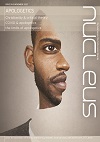'Why get bogged down in studying critical theory when Holy Scripture is sufficient for our every need and question?'
'You'll never argue someone into the Kingdom of God'
Defined broadly as 'reasoned arguments or writings in favour of something', [1] the term 'apologetics' comes from the Greek apologia, translated as 'reasoned defence'. [2] Christians usually base this on a passage in 1 Peter: But in your hearts, set apart Christ as Lord. Always be prepared to give an answer to everyone who asks you to give the reason for the hope that you have. But do this with gentleness and respect. (1 Peter 3:15) Yet like the hypothetical commentators at the beginning of this article, we can wrongly dismiss apologetics. Of course, we must be mindful of the limitations of persuasion and discourse; and remember that God has spoken in these last days through his Son. [3]
Talking about the Christian faith is not 'just' a matter of proclaiming the truth. Jesus preached and taught crowds, but also taught much smaller groups, or one- on-one. Paul spoke in synagogues, but also discussed faith in the Areopagus in Athens, [4] and in the homes of those he stayed with. It is clear from the way these conversations are recorded in the Bible that they are not monologues. So Peter's command is surely for us all. We should be ready to explain what we believe and why. Giving these reasons leads to questions, and it seems reasonable that we should answer these.
how might we 'prepare to give an answer'?
First, know what they are asking. As a GP, I begin most consultations with 'How can I help you today?' Sometimes, the initial answer explains exactly why the patient is there. 'I think I have a chest infection' or 'You told me to come back about now to see how the tablets were working, doctor'. This can be dealt with easily — at least, providing the tablet in question isn't one of 20 on a medication list (yes this really does happen — and no, it really shouldn't happen in most cases!). But often it is not quite so simple. A query about a patch of dry skin, easily answered, often leads to a pause, followed by 'Can I ask while I'm here about …', and sure enough the actual problem that concerns the patient most is discussed. Sometimes this is a mental health problem, at other times a deep-seated worry about serious disease, or a problem that might cause embarrassment, like symptoms of an STI. Careful listening and asking questions makes it easier to discern the real problem more quickly and reduces the risk that they will leave without discussing what was really bothering them. Discussions with friends about faith are not so different. Occasionally, someone will just come out and ask what we believe, or how we came to believe. But more often we'll be asked a more specific question. Just as in the surgery, some questions may be a bridge to something more important. We need to get to the underlying issue. Discernment is vital.Jesus was once presented with a Roman coin and asked about tax payments. [5] His response to this clear 'trap' amazed the listeners. But I think he responded as he did because he could see the motivation behind the question. If the question had come from a desperately poor member of society for whom struggling to pay the tax was a serious personal issue, the style of his response might have been different, even if the underlying conclusion he reached would probably have been the same. A modern-day example might involve discussions over the perceived incompatibility of Christianity and evolution.
For many questioners, the issue won't have a strong personal dimension for them. Christians don't necessarily agree on the answer anyway, meaning it is easy for the well-meaning believer to defend their own position, leaving little space to talk about God or Jesus. But suppose your questioner is a genetic scientist who is seriously exploring Christianity but worries that some of what they see isn't compatible with their scientific expertise. Whether or not their understanding of such incompatibility is correct, this is then a much more serious and personal issue, and your approach to the conversation is likely to be very different. Although much has been written on suffering and Christian faith from an intellectual perspective, a seemingly technical question about it may well indicate an ongoing deep issue, such as a bereavement, or chronic illness. Questions around sexual ethics or gender issues may be very similar. It is a good principle to assume that any question is about something personal unless it becomes clear that this isn't the case.
By listening carefully to questions, we will discern what the real issues are and be more helpful; we will also spot hidden agendas or suffering and be sensitive to these. Just as important — know the gospel and be able to present the main points clearly. This might seem obvious, but it is surprising how many Christians find this hard to do. We often give the opportunity to try presenting a 'two-minute gospel' early on when doing evangelism training for CMF students, and very few find it easy. Even if we know the basics, most of us find it hard to talk about sin or judgment even though we know that they are important.
Of course, Jesus is central to the gospel; but without mention of judgment or sin the gospel is incomplete, and indeed intellectually incoherent. A plan to help us present the key points clearly helps us to avoid missing anything vital, and ensures that we keep Jesus at the centre of what we say. There are many 'gospel outlines' that people use to do this - one example we've often used in CMF is 'God-Man-God', which I describe in more detail in an article in the freshers' [6] Those who like images may prefer 'Two Ways to Live'; [7] others may want to use Glen Scrivener's '3 2 1' idea. [8]
Second, we should get the 'ultimate' question right. Though there are many intellectual questions raised about Christianity, ultimately the truth or otherwise of the Christian faith turns on whether Jesus rose from the dead. [9] Know the basics of the evidence. This has been covered in some depth previously in Nucleus, [10,11] and bethinking.org is another good source.
Third, we need to be prepared to answer questions raised. This may not be so much of a challenge as we think. There seem to be a near infinite number of things that someone could ask about our faith. But experience suggests that, at least in a specific culture and time, the same few things are likely to keep coming up. Preparation is not much different to revising for medical school exams. After my third year MCQ, it was the question about whether a patient with a cough should give up his pet parrot on the grounds that he might have psittacosis that caused endless discussion over a drink afterward. But most of that otherwise long forgotten exam covered common conditions; ischaemic heart disease, diabetes, COPD. But those didn't stick in my mind like the parrot!
My friends and I all shared the anecdotally common medical student interest of trying to dig up the rarest condition to be found in the hospital, certain that it would come up, but of course these questions weren't actually in the exams too often — it was just that recall bias meant that we always remembered them when they were. It is not much different when we look at common objections to the Christian faith. By all means hone your theory on the exact meaning of the ten horns of the dragon in Revelation [12] in case someone asks you about it; but in reality you are probably best sticking to the topics that are most likely to come up. Conversations with CMF students over the year suggest that the most common questions a UK medical student is likely to ask centre on:
- sexuality and gender
- suffering
- science and faith
- the nature of God (such as 'Is God a Moral Monster?')
- is Jesus the only way to God? (including other religions and atheism)
- is the Bible reliable?
There is plenty of material available on all of these. Please see the resources box above.
how might this all help?
Assuming we've done all these things, what might be the result?We usually think of apologetics as being for others. Study will help us be able to give a clearer and more coherent answer when asked to account for the hope that is in us. The Holy Spirit, of course, works in these conversations too, but the Bible seems quite clear we should learn and grow in our understanding as he works in us.
But isn't apologetics just as important for believers? The life of any healthcare student will involve situations that make questions around suffering or gender identity very real and personal. If we have considered what Scripture says about these things beforehand, we will be much better placed to trust in God when dealing with these issues; as a result, we'll be much less likely to be knocked off course when challenges come.
It would be a very unusual Christian testimony indeed to go through a life of faith without ever having doubts about our beliefs. We believe in Christianity because it is true. Knowing the evidence behind our beliefs should help sustain our faith in difficult times where we might not feel it is all true, but can still know Jesus' words are eternal truth. ?
































